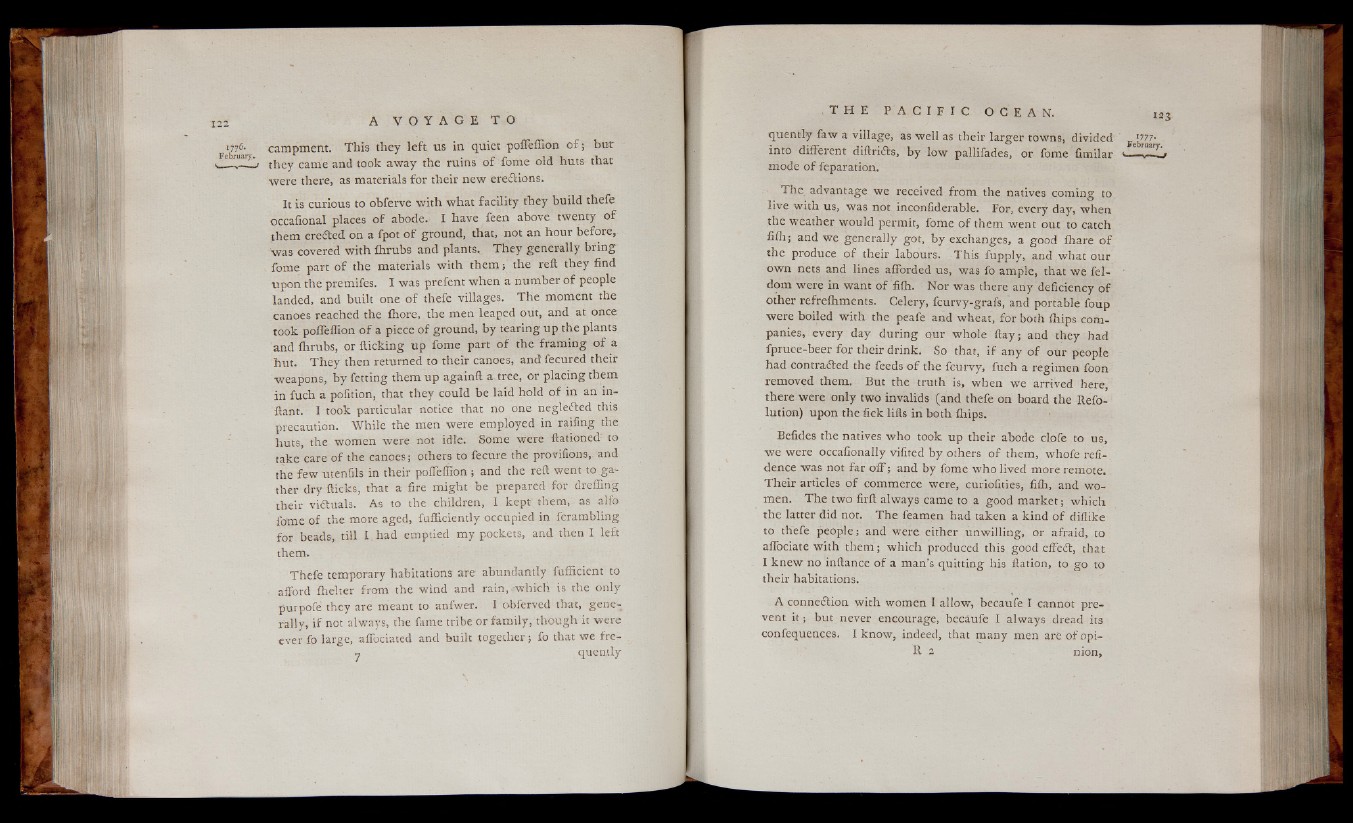
1776' campment. This they left us in quiet pofleflion o f ; bu-t
'.Fe-“—y.| they came and took away the ruins of fome old huts that
were there, as materials for their new erections.
It is curious to obferve with what facility they build thefe
occafional places of abode- I have feen above twenty of
them erefted on a foot o f ground, that, not an hour before,
was covered with ihrubs and plants. They generally bring
fome part of the materials with them; the reft they find
upon the premifes. I was prefent when a number of people
landed, and built one of thefe villages. The moment the
canoes reached the ihore, the men leaped out, and at once
took pofleflion of a piece of ground, by tearing up the plants
and ihrubs, or flicking up fome part of the framing of a
hut. They then returned to their canoes, and fecured their
weapons, by fetting them up againft a tree, or placing them
in fuch a pofition, that they could be laid hold of in an in-
ftant. I took particular notice that no one negleifted this
precaution. While the men were employed in railing the
huts, the women were not idle. Some were ftationed to
take care of the canoes; others to fecure the provifions,. and
the few utenfils in their pofleflion ; and the reft went to gather
dry flicks, that a fire might be prepared for dreffing
their viftuals. As to the children, I kept them, as alfa
fome of the more aged, fufficiently occupied in fcrambling
for beads, till I had emptied my pockets, and then I left
them-
Thefe temporary habitations are abundantly fuflicient to
afford ihelter from the wind and rain,-which is the only
purpofe they are meant to anfwer. I obferved that, generally,
if not always, the fame tribe or family, though it were
ever fo large, affociated and built together; fo that we fre-
| quently
quently faw a village, as well as their larger towns, divided ie'b777,
into different diftricfts, by low pallifades, or fome fimilar
mode of feparation.
The. advantage we received from the natives coming to
live with us, was not inconfiderable. For, every day, when
the weather would permit, fome of them went out to catch
fiflr; and we generally got, by exchanges, a good ihare of
the produce of their labours. This fupply, and what our
own nets and lines afforded us, was fo ample, that we fel-
dom were in want of fifh. Nor was there any deficiency of
other refrefhments. Celery, fcurvy-grafs, and portable foup
were boiled with the peafe and wheat, for both ihips companies,
every day during our whole ftay; and they had
fpruce-beer for their drink. So that, if any of our people
had con trailed the feeds of the fcurvy, fuch a regimen foon
removed them. But the truth is, when we arrived here,
there were only two invalids (and thefe on board the Refo-
lution) upon the fick lifts in both ihips.
Befides the natives who took up their abode clofe to us,
we were occafionally vifited by others of them, whofe r e li-
dence was not far o ff; and by fome who lived more remote.
Their articles of commerce were, curiofities, fiih, and women.
The two firft always came to a good market; which
the latter did not. The feamen had taken a kind of diflike
to thefe people; and were either unwilling, or afraid, to
aflociate with them; which produced this good e ffed t, that
I knew no inftance of a man’s quitting his ftation, to go to
their habitations.
A connexion with women I allow, becaufe I cannot prevent
it; but never encourage, becaufe I always dread its
confequences. I know, indeed, that many men are of opi-
R 2 nion,